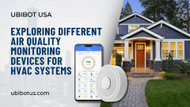Exploring Different Air Quality Monitoring Devices for HVAC Systems
Posted by UBiBot USA on Feb 15th 2024
The comfort and health of people in residential and commercial settings are greatly influenced by Indoor Air Quality Monitoring System, which is an important aspect. Since most people spend their time indoors, it is critical to maximize the quality of the air they breathe. Using monitoring equipment for HVAC (heating, ventilation, and air conditioning) systems is essential to ensuring appropriate indoor air quality.
The Importance of Indoor Air Quality Monitoring
Allergies, respiratory conditions, and even decreased productivity can be caused by poor indoor air quality. Keeping an eye on the air quality in your home or place of business enables you to quickly detect and resolve any possible issues. The following are the reasons why IAQ monitoring is important:
- Protect Health: Hazardous pollutants such as carbon dioxide (CO2), particulate matter, and volatile organic compounds (VOCs) can be found with the use of monitoring instruments. Frequent observation combined with prompt intervention can greatly lower the chance of health problems.
- Increase Comfort: In addition to measuring pollutants, these monitors keep an eye on temperature and humidity levels to make sure the interior climate is favorable and comfortable for residents.
- Save Energy: Optimized HVAC operations are made possible by effective IAQ monitoring. These devices can save energy by monitoring air quality and activating filtration or ventilation systems when needed.
- Regulatory Compliance: Regulatory agencies have established specific air quality guidelines for a number of businesses. Monitoring tools assist companies in making sure these criteria are followed and avoiding fines.
Top Monitoring Devices for HVAC
- Air Quality
Index (AQI) Monitors:
- Real-time data display.
- Ability to track multiple pollutants.
- Mobile app integration for remote monitoring.
- Alerts and notifications for poor air quality.
You can efficiently control air ventilation, filtration, and purification Indoor Air Quality Monitoring System by routinely monitoring IAQ with AQI monitors.
- Carbon
Dioxide (CO2) Detectors:
- Accurate and instant CO2 measurement.
- Integration with HVAC systems for automatic ventilation adjustments.
- Visible indicators or audible alarms for increased awareness.
CO2 detectors are highly useful in workplaces, schools, and other crowded settings where occupants' CO2 exhalations can quickly accumulate.
- Volatile
Organic Compound (VOC) Sensors:
- Detection of various VOC compounds.
- Continuous monitoring and data logging.
- Integration with HVAC systems for prompt response.
By installing VOC sensors, you can be confident that dangerous gasses are identified right away and take the appropriate action to keep your home healthy.
- Particulate
Matter (PM) Monitors:
- Real-time particulate matter measurement.
- Ability to differentiate between PM5 and PM10 particles.
- Integration with filtration systems for enhanced air purification.
- Data visualization for prompt actions.
PM monitors are especially useful in high-pollution locations, during wildfire seasons, and for people with respiratory disorders.
Uncover the Benefits of Smart Air Quality Devices for HVAC Systems
Good indoor air quality (IAQ) is essential for general health, and poor IAQ can cause a number of diseases. With their sophisticated Smart Air Quality Sensor and algorithms, smart air quality devices are essential for monitoring and enhancing indoor air quality in our homes and workplaces.
The Benefits of Smart Air Quality Devices:
- Real-time Monitoring: Continuous monitoring provides real-time updates and alerts about the air conditions, ensuring awareness of the quality of the air being breathed.
- Improved Health: Detecting and eliminating harmful particles contributes to a healthier indoor environment, reducing exposure to pollutants and alleviating common allergy symptoms.
- Energy Efficiency: Smart devices work in sync with HVAC systems, optimizing their performance by regulating airflow and adjusting temperature settings based on air quality, leading to energy savings.
- Cleaner Air and Reduced Odors: Equipped with filters, these devices capture dust, pet dander, and allergens, providing cleaner air and diminishing unpleasant odors.
Choosing the Right Air Quality Monitoring Device for Your HVAC Needs
Devices for monitoring indoor air quality, such as those that track and measure variables including temperature, humidity, particulate matter, and volatile organic compounds (VOCs), are essential. Selecting the ideal HVAC (heating, ventilation, and air conditioning) device can be difficult given the abundance of options on the market. Take into account the following elements to help with the selecting process:
Factors to Consider when Choosing an Air Quality Monitoring Device:
- Accuracy and Sensitivity: Choose a device with high-quality sensors for accurate and sensitive measurements.
- Parameters Measured: Consider the specific parameters you want to monitor, such as temperature, humidity, CO2 levels, particulate matter, VOCs, etc.
- User-Friendly Interface: An intuitive interface is crucial for effortless monitoring and understanding of real-time readings.
- Connectivity and Compatibility: Ensure the device can connect to your HVAC system or other smart home devices for seamless integration.
- Data Logging and Analysis: Look for devices with data logging capabilities to track air quality trends over time.
- Cost and Maintenance: Ensure the device fits your budget, and consider ongoing maintenance requirements, including Smart Air Quality Sensor replacements.
Types of Air Quality Monitoring Devices:
- Basic Air Quality Monitors: Measure temperature, humidity, and CO2 levels, suitable for residential or small office spaces.
- Advanced Air Quality Monitors: Measure additional parameters like PM5, PM10, VOCs, and formaldehyde, suitable for larger commercial spaces.
- Smart Air Quality Monitors: Provide connectivity options for seamless integration with smart home systems, allowing remote monitoring and control.
- Industrial Air Quality Monitors: Robust devices designed for industrial environments, adhering to strict safety and compliance standards.
Top of Form

